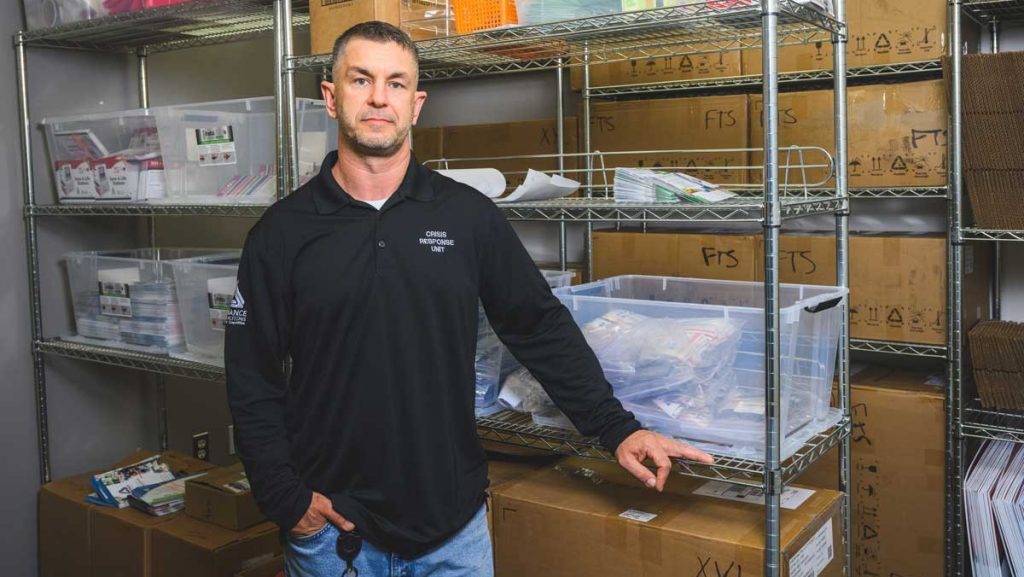The Metro: Oakland County’s new approach to supporting people with drug addiction
John Filbrandt September 25, 2024Recovery Support Specialist Paul Shankin joined the show to share how he’s supporting individuals with addiction issues in his role with the county.

Paul Shankin works with the Alliance of Coalitions for Healthy Communities, a prevention, harm reduction and recovery support network in Oakland County.
Overdose deaths are down in the U.S. for the first time since 2020. From April of last year to this year, overdose deaths dropped by roughly 10% to just over 100,000.
While the numbers are trending down both nationally and in Michigan, they are still extremely high over the last two decades.
Subscribe to The Metro on Apple Podcasts, Spotify, NPR.org or wherever you get your podcasts.
Recovery Support Specialist with Oakland County Paul Shankin joined The Metro on Wednesday to share his own personal experience on his recovery journey, and how he is supporting individuals with addiction issues in his role with the county.
“Twelve step fellowships did work for me, and I do understand, and it’s true, it does not work for everybody. I’ve seen people go to 12-step fellowships that probably should have never walked in the doors of it. There’s other ways they could have done it that helped,” Shankin said. “But for me, there was just a network of people that I like to say, that literally felt like they were waiting for me. You know, when I walked into them rooms and they knew exactly what to do with me. That, when I was really high up emotionally they knew how to bring me right back down. When I was really low, they know how to bring me right up. And they just created this balance.”
Shankin says Oakland County is taking a new approach to helping people suffering from addiction issues by partnering with the Alliance of Coalitions for Healthy Communities to provide prevention, wellness and recovery support.
“And what’s like really unique about this situation is, I wouldn’t say it’s the first time, but it’s still very new that you have law enforcement, and a person or people with lived experience and in recovery that are now teaming up and going into the community and meeting up with people who are suffering and trying to come up with a solution together to get help for them,” Shankin said.
Use the media player above to hear the full interview with Shankin.
More headlines from The Metro on Sept. 25, 2024: .
- Next month, The Scarab Club will host an exhibition titled “Detroit Leni: A Leni Sinclair Retrospective,” highlighting some of Sinclair’s most memorable works. Dalia Reyes, gallery director of the Scarab Club, joined the show to chat more about the exhibit.
- Detroit’s QLINE will transfer its operations to the Regional Transit Authority by the end of the month. WDET’s Bre’Anna Tinsley spoke to RTA Director Ben Stupka about the change in operation and what it means for transit in the region.
- On Monday, Livingston County Commissioners unanimously approved a resolution permitting the sheriff’s office to track interactions with undocumented immigrants. Policy, Engagement, and Communications Manager at the Michigan Immigration Rights Council Christine Sauvé joined The Metro to discuss what this means for people living in the county.
Listen to The Metro weekdays from 11 a.m. to noon ET on 101.9 FM and streaming on-demand.
Trusted, accurate, up-to-date.
WDET strives to make our journalism accessible to everyone. As a public media institution, we maintain our journalistic integrity through independent support from readers like you. If you value WDET as your source of news, music and conversation, please make a gift today. Donate today »Author
-
Jack Filbrandt is an assistant producer on WDET's daily news, arts and culture program, The Metro. He grew up on Lake Michigan and has called Detroit home for seven years. He's also a Detroit Documenter, covering local government meetings in the city. He previously worked for Wayne State's student newspaper, The South End, and The Battering Ram.
